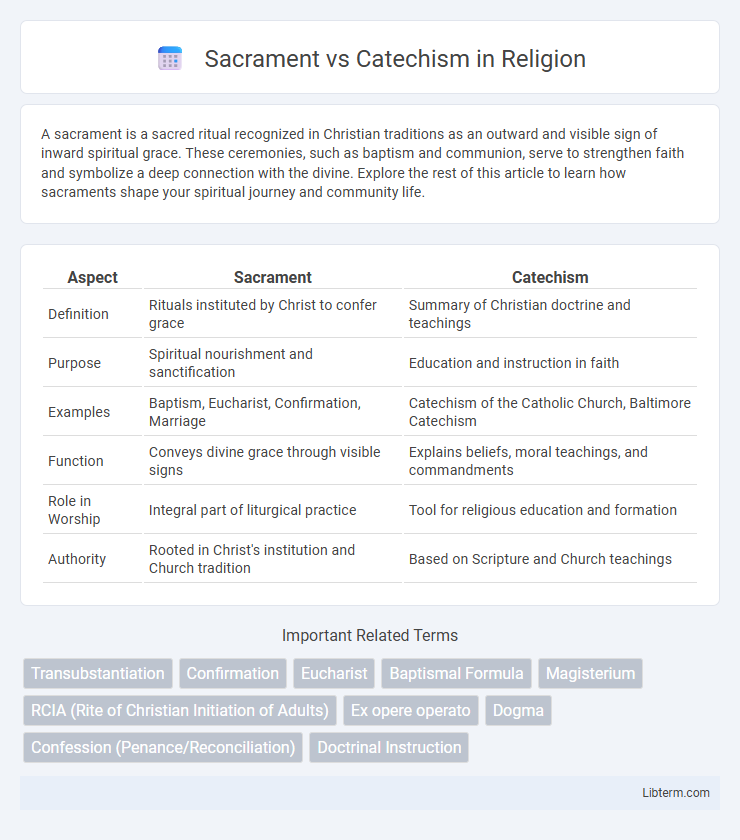A sacrament is a sacred ritual recognized in Christian traditions as an outward and visible sign of inward spiritual grace. These ceremonies, such as baptism and communion, serve to strengthen faith and symbolize a deep connection with the divine. Explore the rest of this article to learn how sacraments shape your spiritual journey and community life.
Table of Comparison
| Aspect | Sacrament | Catechism |
|---|---|---|
| Definition | Rituals instituted by Christ to confer grace | Summary of Christian doctrine and teachings |
| Purpose | Spiritual nourishment and sanctification | Education and instruction in faith |
| Examples | Baptism, Eucharist, Confirmation, Marriage | Catechism of the Catholic Church, Baltimore Catechism |
| Function | Conveys divine grace through visible signs | Explains beliefs, moral teachings, and commandments |
| Role in Worship | Integral part of liturgical practice | Tool for religious education and formation |
| Authority | Rooted in Christ's institution and Church tradition | Based on Scripture and Church teachings |
Understanding the Sacrament: Definition and Purpose
The sacrament is a sacred rite recognized as an outward and visible sign of inward spiritual grace, central to many Christian traditions for conveying divine presence and sanctification. Catechism provides structured teaching and explanation of these sacraments, offering detailed understanding of their theological significance, rituals, and purposes within the faith. Understanding the sacrament involves grasping its role as a means of God's grace that fosters spiritual growth, community bonding, and faithful commitment.
What Is Catechism? Meaning and Significance
Catechism is a structured summary of Christian doctrine used for religious instruction, often presented in a question-and-answer format to facilitate learning and comprehension. It serves as a foundational tool for teaching the beliefs, moral principles, and practices of the faith, guiding individuals in understanding the core tenets of Christianity. The significance of catechism lies in its role as a catechetical resource that prepares believers for participation in sacraments and fosters spiritual growth through systematic religious education.
Historical Origins: Sacraments and Catechisms in Christianity
The historical origins of sacraments trace back to early Christian rituals instituted by Jesus Christ, such as baptism and the Eucharist, which were formalized by Church councils in the first centuries AD to signify grace and covenant. Catechisms developed later, around the 4th century, serving as instructional manuals to educate new converts and young Christians about core doctrines and the meaning of sacraments. Both sacraments and catechisms played essential roles in shaping Christian liturgy and teaching, with sacraments embodying sacred rites and catechisms providing structured theological education.
Key Differences Between Sacrament and Catechism
Sacraments are sacred rites recognized as outward signs of inward grace in Christian traditions, such as Baptism and Eucharist, serving as direct means of spiritual connection with God. Catechism, on the other hand, is a formal summary or exposition of Christian doctrine often presented in question-and-answer format, designed to instruct believers in the faith's teachings and principles. The key difference lies in sacraments being ritualistic practices with spiritual efficacy, while catechism functions as educational content guiding theological understanding.
Role of Sacraments in Christian Spiritual Life
Sacraments serve as vital channels of grace in Christian spiritual life, symbolizing and actualizing divine presence and transformation within believers. They mark key stages of faith development, such as baptism initiating spiritual rebirth and Eucharist fostering ongoing communion with Christ. Unlike catechism, which provides doctrinal instruction and theological foundation, sacraments offer tangible, sacred encounters that nurture spiritual growth and deepen personal faith experience.
The Function of the Catechism in Faith Formation
The Catechism serves as a comprehensive guide that systematically presents the core beliefs and teachings of the faith, ensuring clarity and consistency in religious education. It functions as an essential tool for catechists, clergy, and laypeople to deepen understanding and foster personal spiritual growth through structured instruction. While the Sacrament embodies the outward sign of grace, the Catechism provides the doctrinal foundation necessary for preparing individuals to fully participate in the sacramental life.
How Sacraments and Catechism Intersect
Sacraments and catechism intersect through catechism's role in teaching the theological significance and proper reception of sacraments such as Baptism, Eucharist, and Confirmation. Catechism provides structured religious education that explains the meaning, symbols, and effects of sacraments, ensuring that believers understand their spiritual importance and participate fully. This intersection reinforces the sacraments as essential rites of initiation and grace within Christian faith formation.
Common Misconceptions About Sacrament vs Catechism
Common misconceptions about sacrament vs catechism arise from confusing the two as interchangeable concepts. Sacraments are sacred rites like Baptism or Eucharist that convey spiritual grace, while catechism refers to the systematic instruction in Christian doctrine often delivered through a question-and-answer format. Understanding that sacraments are experiential practices and catechism is educational content helps clarify their distinct roles within Catholic faith and practice.
Importance of Both in Modern Christian Practice
Sacraments, as sacred rituals like baptism and communion, serve as tangible expressions of faith and divine grace in modern Christian practice, grounding believers in spiritual experience and community identity. Catechism provides essential religious education and doctrinal foundation, ensuring that believers understand the theological significance and moral teachings underlying these sacraments. Together, they form a complementary framework that sustains personal faith development and communal cohesion within contemporary Christianity.
Sacrament vs Catechism: Which Is More Foundational?
Sacraments are foundational rites instituted by Christ that impart grace and are essential for spiritual life, while catechism provides structured teaching and doctrinal understanding of faith. The sacrament embodies the lived, experiential aspect of faith through tangible signs like baptism and Eucharist, whereas catechism serves as the educational framework explaining the meaning and significance of these rites. Sacraments are more foundational as they actualize and initiate believers into the faith community, with catechism supporting the deepening of that faith through knowledge and formation.
Sacrament Infographic

 libterm.com
libterm.com